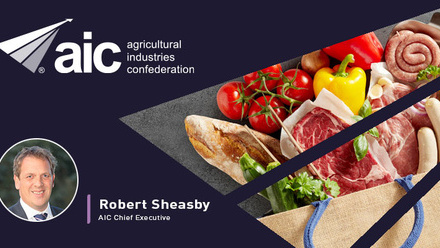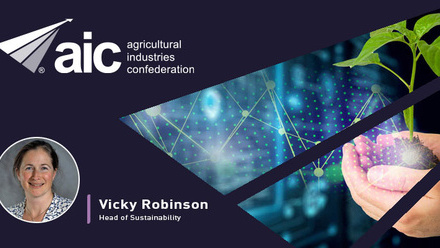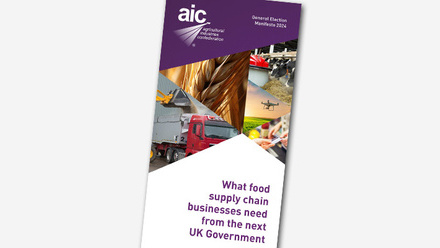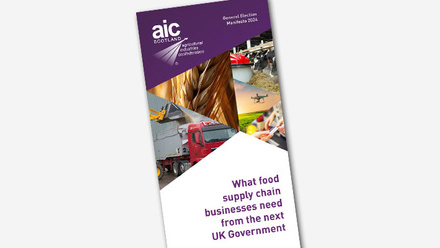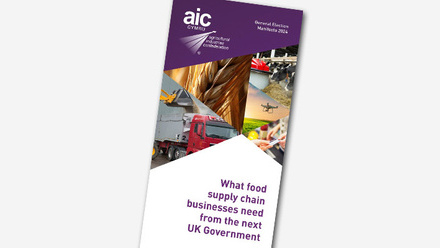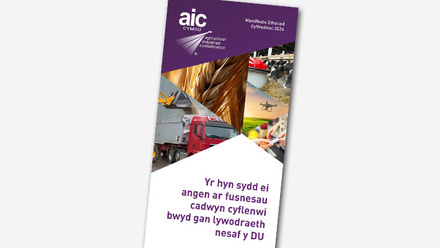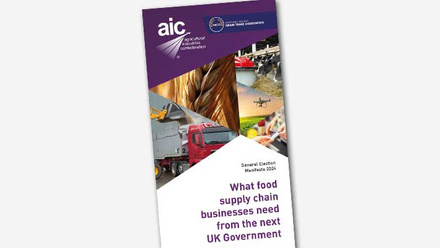Blog: How a veterinary "SPS" agreement with the EU can improve trade and boost UK agriculture

Agricultural supply businesses provide UK farmers and growers with the essential inputs they need to feed the nation. To do this, they continually navigate an intricate and often challenging regulatory landscape. The next UK Government needs to work to improve trade with the EU, and within the UK nations, as AIC's Head of Policy & External Affairs Ed Barker explains.
UK agriculture’s productivity and prosperity hinges on efficient and frictionless global trade, particularly with our closest trading partner, the European Union.
Since the UK’s formal departure from the EU in 2020, AIC Members in the animal feed, crop protection and agronomy, fertiliser, seed and grain trading sectors have endured a myriad of trade disruptions.
It is true that there are potential benefits of regulatory divergence enabled by EU Exit, as seen with the UK approach to precision breeding (gene editing), deforestation, and speed of decisions made on trade and tariff policy.
However, there can be little doubt that the lack of alignment on veterinary or phytosanitary measures has often resulted in increased complexity, delays, and costs for businesses.
This divergence has led to frequent, frustrating and unpredictable barriers at borders, adversely affecting the trade of vital agricultural goods such as seed, fertilisers, animal feed, and crop protection products that UK farmers need to produce our food.
This impacts our ability to sell to other countries too. Examples of costly headaches include UK-grown cereals for export being held up in European ports, exported animal feed being returned to Great Britain due to misunderstandings over paperwork, and seed export times that can be measured in months rather than days.
While businesses have adapted as best they can, the status quo is not sustainable. There is an urgent need for a coherent strategy to streamline our trade processes and reduce the regulatory friction with the EU – something which other third countries situated further away from Europe enjoy.
Clear benefits
AIC believes that one of the most effective solutions to these challenges would be to negotiate a veterinary or “Sanitary/Phytosanitary (SPS)” agreement with the EU.
Reassuringly, this is something that the 2024 General Election manifestos of a number of UK political parties acknowledge.
Such an agreement could help harmonise standards for animal and plant health, significantly reducing the need for extensive checks and paperwork at borders.
Visit our General Election 2024 webpage to view AIC’s asks of the next UK Government.
AIC Members can view exclusive insight comparing the main political party pledges on trade and many other issues and a dedicated webinar recording by clicking below.
Scope for improvement
We cannot expect to return to entirely frictionless trade while we are no longer inside a customs union or single market, but we can certainly improve it.
We know that other sectors – including seafood, fresh produce, pet food, ornamental crops, frozen food, and even used machinery trade – are also clamouring for this, and AIC continues to work alongside them in support of a common goal.
One of the most challenging outcomes of current UK-EU trade is the unpredictability. In some cases, consignments arrive at destinations in the EU without a hitch, yet at other times it may be held up or delayed.
The break-up of the internal market of the UK by having Northern Ireland outside of Great Britain's regulatory systems compounds the issue further.
Beyond the immediate trade facilitation benefits, an SPS agreement could foster closer regulatory cooperation. The UK and EU are not going anywhere. We are inevitably going to remain close trading partners, despite trade challenges.
This is why AIC is an active member of the European agri-supply trade bodies COCERAL, FEFAC, and Euroseeds.
Through these forums, we can exchange vital information with our associations, but without better cooperation at government level, we can only address symptoms, as opposed to the causes of trade friction.
What Government can do
With less than two weeks until the nation goes to the polls in the General Election on 4 July 2024, the next UK Government must prioritise the negotiation of an SPS, agreement with the EU.
This should be part of a broader strategy to actively monitor and manage policy divergences not just with the EU, but also within the UK’s internal market where we see misalignment between England, Scotland, Wales, and Northern Ireland on technical standards and approvals.
Establishing a formal mechanism for tracking these divergences will provide much-needed clarity and support for businesses navigating this complex landscape.
Achieving an SPS agreement represents a pragmatic and necessary step towards improving the UK’s agricultural trade with the EU.
By reducing barriers, simplifying procedures, and fostering regulatory alignment, we can ensure that our agri-supply industry remains competitive and resilient, driving growth and sustainability for the wider agricultural sector and food supply chain.
AIC stands ready to work with whoever forms the next UK Government to help make this happen.
More on AIC's manifesto
For more on the AIC 2024 General Election Manifesto - "What food supply chain businesses need from the next UK Government" - visit the election webpage, or click below to view and download a copy.




